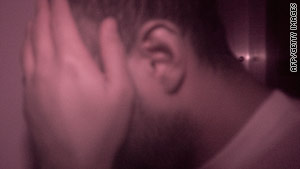Scammer
Banned

A man believed to be Saud Bin Abdulaziz Bin Nasser Bin Al Saud hides his face in a police van in February.
London, England -- The defense lawyer for a Saudi prince charged with killing his aide admitted Monday that his client had committed the crime but disputed the prosecution's contention that he had done so willfully.
Prince Saud Abdulaziz Bin Nasser Al Saud is on trial at London's Central Criminal Court in the death of Bandar Abdulaziz in a London hotel room in February. He did not take the stand in his own defense.
Barrister John Kelsey-Fry gave his client's side of the story for the first time in the two-week trial, telling the jury during his closing argument that the "parts that really matter" -- the evidence -- were not in dispute. Al Saud, he said, "must live with the consequences" of having killed Abdulaziz, but he never intended to harm him.
The jury hearing the case is tasked with deciding whether it is a case of murder or manslaughter. To do that, jurors must first determine the prince's state of mind and his intent at the time he killed Abdulaziz.
Abdulaziz died after a severe beating left him with swelling and bruising of the brain and fractured ribs and neck. He also had bite marks on his face, ears and arm.
The two men were in London earlier this year as Al Saud took in Morocco, the Maldives and other European cities on a long global holiday with Abdulaziz as his companion.
Kelsey-Fry reminded the jury that the pathologist had been unable to determine how Abdulaziz died but that only one of his injuries, by itself, could have killed him -- a compression of the neck, the barrister said, that could have been caused when Al Saud grabbed Abdulaziz briefly by the throat.
An "awful, reprehensible, culpable act," he said, "but an act of murder?"
Kelsey-Fry also challenged the prosecution's assertion that the defendant and the victim had a master-servant relationship, telling the jury that the two men had "enjoyed a genuine friendship." He also disputed the prosecution's suggestion that the prince and his aide had a gay relationship, although the two men shared a hotel room, went shopping together and stayed out late in bars and nightclubs.
A series of witnesses had testified that both men appeared to be gay. One witness, a hotel porter, described how he had gone to the room the two men shared in the hotel and observed them sorting their clothes by color and type.
"Outward appearance can be misleading," said Kelsey-Fry,
Earlier in the day, prosecutor Jonathan Laidlaw presented his closing argument. He told the jury they might consider drawing an "adverse inference" from the prince's refusal to face questions.
The case "cries out for an explanation," he said, adding that the jury might care to reflect on how the prince might have answered questions about the nature of his relationship with Abdulaziz, why it was that he attacked him on more than one occasion, his account of what happened the night his aide died and why it was that he waited hours before informing anyone of his death.
When he did contact authorities, Al Saud said that Abdulaziz had been assaulted by robbers three weeks earlier.
He is a man, said Laidlaw, "incapable of telling the truth."
The trial was adjourned until Tuesday.
